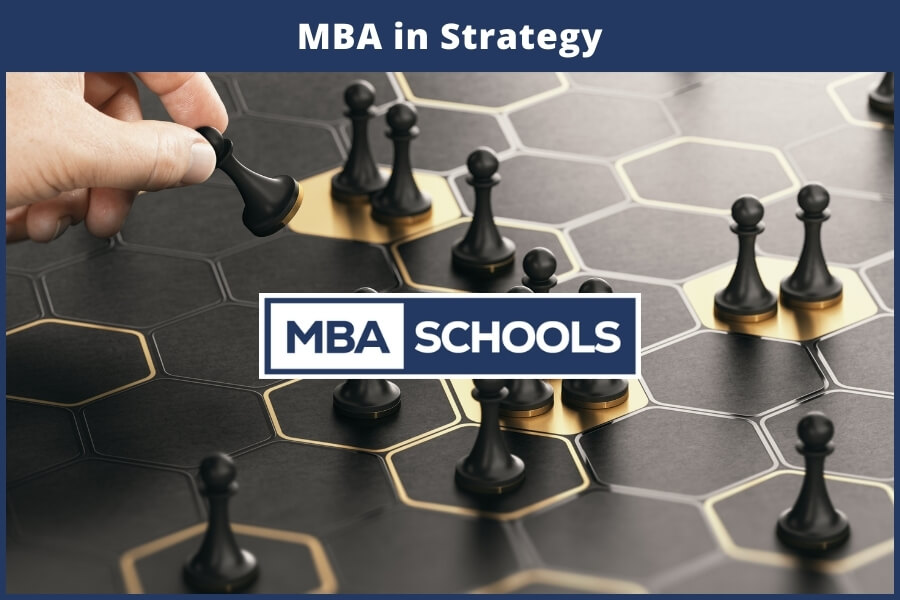MBA in Strategy
An MBA in Strategy is a highly valuable specialization for professionals looking to excel in corporate leadership, business consulting, and strategic decision-making. This specialization focuses on competitive analysis, business modeling, and long-term planning, equipping graduates with the skills needed to drive organizational success in fast-changing industries.
According to the Graduate Management Admission Council (GMAC), corporate strategy MBAs earn a median starting salary of $130,000, among the highest of all MBA specializations ( GMAC). Additionally, a report by McKinsey & Company found that 75% of Fortune 500 executives attribute their success to a strong foundation in strategic thinking and business acumen ( McKinsey).
A Strategy MBA specialization is ideal for professionals aiming to become management consultants, corporate strategists, or executive leaders in competitive industries such as technology, healthcare, finance, and consulting.

Table of Contents
What is an Online MBA in Strategy?
An Online MBA in Strategy allows working professionals to develop high-level business analysis and strategic planning skills while maintaining their current careers. These programs offer flexible learning formats, enabling students to apply competitive analysis, market research, and business innovation strategies in real-world scenarios immediately.
Students gain expertise in corporate strategy, business transformation, and mergers & acquisitions, ensuring they are prepared for leadership roles. Many online programs incorporate real-world consulting projects, case studies, and leadership simulations, providing an immersive learning experience even in a virtual environment.
What Are the Admissions Requirements for an MBA in Strategy?
Admissions requirements for an MBA in Strategy vary by program, but typically include:
- Bachelor’s Degree – From an accredited institution, often in business, economics, or related fields.
- Work Experience – 2-5 years of professional experience in strategy, consulting, or management roles is preferred.
- GMAT/GRE Scores – Some programs require standardized test scores, while others offer waivers.
- Personal Statement – Discussing career goals and why the applicant is pursuing an MBA in Strategy.
- Letters of Recommendation – Typically from employers or academic mentors.
- Resume – Highlighting experience in strategic planning, business development, or leadership roles.
Is an MBA in Strategy the Right Specialization for You?
An MBA in Strategy specialization is best suited for professionals who enjoy problem-solving, market analysis, and corporate leadership. If you are passionate about identifying growth opportunities, managing business risks, and making data-driven decisions, this specialization will provide the tools needed for career success.
Compared to other MBA specializations, such as Finance or Operations Management, an MBA in Strategy focuses on long-term business planning, innovation management, and competitive positioning. If you are interested in leading organizations through complex business challenges, this program may be the best fit for you.
MBA in Strategy Curriculum: What Classes Will I Take?
Most MBA in Strategy programs take 1-2 years to complete, depending on whether students enroll full-time, part-time, or in an accelerated format.
Core Courses in an MBA in Strategy
The curriculum for a Strategy MBA specialization blends analytical thinking with executive-level decision-making through courses such as:
- Competitive Strategy & Business Modeling
- Corporate Innovation & Transformation
- Strategic Decision-Making & Risk Management
- Business Analytics for Strategic Leaders
- Mergers, Acquisitions & Corporate Restructuring
- Global Strategy & Market Entry
- Digital Transformation & Business Disruption
- Leadership in Strategic Management
Many programs also incorporate real-world business consulting projects, including case competitions, strategic analysis projects, and executive mentorship programs. Some students complete internships at global consulting firms or multinational corporations to gain practical experience before graduation.
What Career Options Do I Have with an MBA in Strategy?
A Strategy MBA specialization prepares graduates for leadership roles across industries. Common job titles include:
- Management Consultant – Advises businesses on strategic growth, market expansion, and operational efficiency.
- Corporate Strategy Manager – Develops long-term business plans and competitive positioning strategies.
- Business Development Director – Identifies new business opportunities and partnerships.
- Chief Strategy Officer (CSO) – Oversees corporate vision, innovation, and high-level decision-making.
- Mergers & Acquisitions Analyst – Evaluates potential business acquisitions and investment opportunities.
Salary Expectations
Salaries for MBA in Strategy graduates vary based on experience, industry, and location. According to GMAC and McKinsey, strategy professionals with an MBA typically earn:
- Management Consultant – $120,000 – $180,000
- Corporate Strategy Manager – $110,000 – $160,000
- Business Development Director – $115,000 – $170,000
- Chief Strategy Officer (CSO) – $200,000+
- Mergers & Acquisitions Analyst – $100,000 – $150,000
Take the Next Step Toward a High-Impact Career in Strategy
An MBA in Strategy provides the analytical and leadership expertise needed to develop corporate growth plans, drive business transformation, and solve complex business challenges. Whether you want to consult for Fortune 500 companies, lead corporate strategy, or innovate within an industry, this degree will give you the knowledge, skills, and network to achieve your career goals.
Explore top-ranked MBA in Strategy programs today and start advancing your career.
Sources
- Graduate Management Admission Council (GMAC). (2023). Corporate Recruiters Survey: Hiring Trends for MBA Graduates. Retrieved from https://www.gmac.com/
- McKinsey & Company. (2023). Strategic Leadership and Business Growth Report. Retrieved from https://www.mckinsey.com/